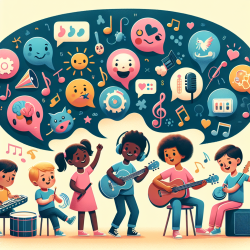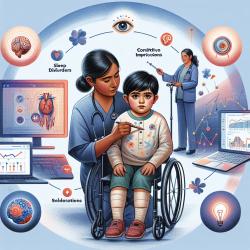In the realm of pediatric rehabilitation, data-driven interventions are paramount for achieving optimal outcomes. The research article titled "Music-based interventions in rehabilitation of children and adolescents with chronic diseases: Sharing an experience from a Brazilian public hospital" by Sampaio et al. (2023) presents compelling evidence on the efficacy of music-based interventions (MBI) in improving the quality of life and therapeutic outcomes for children with chronic diseases. This blog aims to distill the key findings from this study and provide actionable insights for practitioners.
The Power of Music-Based Interventions
Music-based interventions have been shown to stimulate multiple areas of the brain simultaneously, promoting brain plasticity and cognitive development in children with chronic diseases and disabilities. The study conducted at a tertiary children's hospital in São Paulo, Brazil, demonstrated several practical applications of MBI, ranging from alleviating anxiety during hemodialysis to providing emotional support during long-term isolation for immunosuppressed patients.
Key Applications of Music-Based Interventions
- Hemodialysis: Music can reduce anxiety, blood pressure fluctuations, and other discomforts such as nausea. Encouraging children to learn musical instruments can also relieve the boredom associated with long treatment sessions.
- Bone Marrow Transplantation: Music therapy can alleviate emotional distress and promote well-being during long isolation periods. It has been observed to reduce pain and anxiety, improve quality of life, and help children express their feelings in a normalized environment.
- End-of-Life Care: Music, particularly religious music, can provide spiritual support to families and transform the hospital environment into a more peaceful place. This is crucial for helping families cope with the emotional challenges of end-of-life situations.
Implementing Music-Based Exercises
The study provides detailed descriptions of simple musical exercises that can be integrated into therapeutic routines:
- Interactive Singing: Using songs like "Old MacDonald Had a Farm" to engage children in memory and cognitive tasks.
- Instrumental Play: Exercises such as "I will only play my instrument if you play yours with me" to encourage communication and social interaction.
- Group Activities: Allowing children to choose and share musical instruments, fostering leadership and teamwork skills.
Practical Considerations
While the benefits of MBI are well-documented, practitioners must consider sanitation and the sharing of musical instruments, especially in hospital settings. Instruments made of plastic or metal are preferable due to their ease of sanitization. Additionally, cultural sensitivity is crucial when incorporating religious music into therapeutic routines.
Conclusion
Music-based interventions offer a versatile and effective tool for enhancing pediatric rehabilitation. By integrating these practices into therapeutic routines, practitioners can create a more engaging and supportive environment for children with chronic diseases. For those interested in exploring this topic further, the original research paper provides a comprehensive overview of the methodologies and outcomes.
To read the original research paper, please follow this link: Music-based interventions in rehabilitation of children and adolescents with chronic diseases: Sharing an experience from a Brazilian public hospital.










